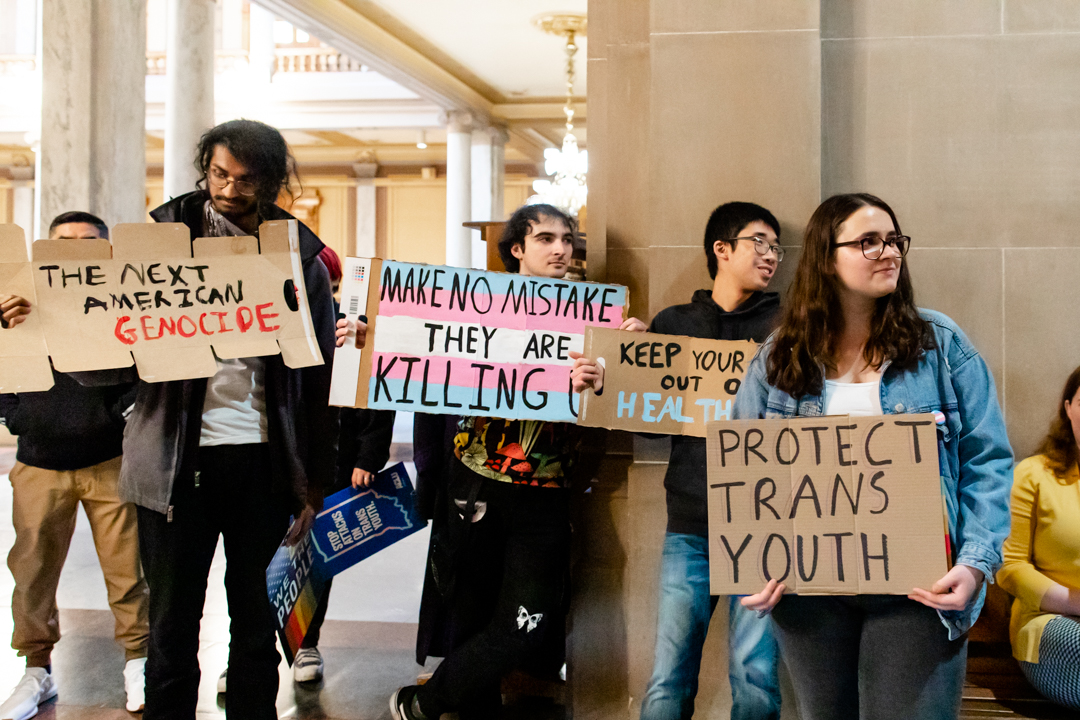Indiana transgender youth are stripped of gender-affirming care as SB 480 passes into law. Photo by Lauren Gdowki.
BEE PILARZ | STAFF REPORTER | lpilarz@butler.edu
The LGBTQIA+ community in Indiana suffered a devastating blow on April 5 when Governor Eric Holcomb signed Senate Bill 480 into law. This law prohibits any medical professionals from providing gender-affirming care to a minor. Additionally, medical professionals are not allowed to aid another professional in providing this care, meaning they cannot refer patients to another practitioner.
Any minors already receiving gender-affirming care in the state will lose access to these resources when the law goes into effect on July 1. These minors will also be expected to discontinue their use of gender-affirming care by Jan. 1, 2024.
SB 480 is the first bill passed of 18 total anti-LGBTQIA+ introduced in the state of Indiana this year. Members of the LGBTQIA+ community have been actively protesting these bills, with the most notable rallies hosted by the Indiana division of the American Civil Liberties Union in late February.
Several members of the Butler community attended these rallies to protest, and have continued to express their disdain for these bills. Kay Duchemin, a sophomore music industry studies and creative media and entertainment double major, said they knew teenagers who wanted to pursue gender-affirming care, and are now worried about the mental health of these minors when this care is taken away.
“I wouldn’t be shocked if, in terms of statistics, we saw mental health becoming an even worse [issue] than it already is,” Duchemin said. “It’s very demeaning to have these roadblocks for kids.”
Sophomore music education major Ashton Roman started his transition in 2017. He said his experience was supported not just by his family and friends, but also by his therapist and the medical professionals in his life.
“They’ve seen me go through everything,” Roman said. “I don’t understand why people would try to take that away. I was in a very bad spot and [gender-affirming care] definitely helped me transition out of that.”
Roman said that, while he has been on hormone replacement therapy since he was 15, his transition did not start with medical care. Initially, Roman said his transition was social, which included changing his name and pronouns as well as getting a traditionally masculine haircut. Roman also said it took him nearly five months worth of appointments as well as therapist approval before he was prescribed testosterone and started hormone replacement therapy.
Even before the passing of SB 480, no surgical procedures were performed on minors as gender-affirming care. The Gender Health Program provided by the Riley Children’s Center and Indiana University Health provides gender-affirming care including counseling, hormone therapy and menstrual suppression in addition to surgical consultation.
Roman’s case, like that of many transgender children, was taken seriously by his providers at Riley Children’s Center and IU Health, and it was their care that changed Roman’s life for the better.
“I don’t know where I would be if it wasn’t for doing everything I did when I did it,” Roman said.
While this new law will have the harshest impact on transgender youth, the effect it will have on medical professionals is undeniable. History-anthropology lecturer Dr. Jeana Jorgensen compared SB 480 to its equally “chilling” counterpart HB 1608, which seeks to ban discussions of human sexuality in classrooms for those in kindergarten through third grade.
“If I were a [medical] doctor, I would be profoundly insulted at being told how to do my job,” Jorgensen said. “I imagine it’s having a similar chilling effect on the medical profession as we’re seeing among teachers and librarians in the state … because of the threat of being turned in for putting the wrong book in the wrong kid’s hands.”
Jorgensen believes this wave of anti-LGBTQIA+ rhetoric is a product of misinformation and fear when in reality even cisgender people seek gender-affirming care. Specifically, Jorgensen referenced cosmetic surgery and estrogen supplements as care that cisgender women seek out to affirm their gender.
“Lots of people of lots of different types of genders, including the most mainstream … end up receiving gender-affirming care, and it’s completely normalized in our society,” Jorgensen said. “So to see the gender-affirming care needs of one group isolated and demonized is really hypocritical.”
Despite the growing negative response to the passing of SB 480, many in opposition to the law still have hope for the LGBTQIA+ community in Indiana. The Indiana ACLU has already filed a lawsuit against SB 480, claiming it is unconstitutional. Roman said he wants the community to take a united front against this legislature.
“I really hope this is going to be a strong point for everybody to band together to try to show our presence, especially in Indiana,” Roman said.
Similarly, Duchemin expressed hope that the community will continue to be resilient in the face of bigotry.
“I do think [the future is] hopeful,” Duchemin said. “I don’t want this legislation to seem like there’s no hope in the future, because there is … There’s so many people and there’s so much love.”




Pingback: "I don't understand why people would try to take that away" - Brightgram